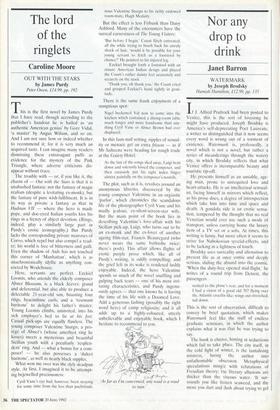The lord of the ringlets
Caroline Moore
OUT WITH THE STARS by James Purdy Peter Owen, ,C14.99, pp. 192 This is the first novel by James Purdy that I have read, though according to the publisher's handout he is hailed as 'an authentic American genius' by Gore Vidal, 'a master' by Angus Wilson, and so on. And I am not sure how or indeed whether to recommend it; for it is very much an acquired taste. I can imagine many readers dismissing these extravagant puffs as evidence for the mystery of the Pink Triangle, where adverse criticisms dis- appear without trace.
The trouble with — or, if you like it, the charm of — Out with the Siam is that it is unabashed fantasy: not the fantasy of magic realism (despite a levitating ex-monk), hut the fantasy of pure wish-fulfilment. It is in its way as private a fantasy as that in Hadrian VII — where the hero is made pope, and doe-eyed Italian youths kiss his rings in a frenzy of abject devotion. (Rings, indeed, play a similarly large part in Purdy's erotic iconography.) But Purdy lacks the corresponding private neuroses of Corvo, which repel but also compel a read- er; his world is free of bitterness and guilt. Even the shadow of Aids has not touched this corner of 'Manhattan', which is as anachronistically idyllic as anything con- cocted by Wodehouse.
Here, servants are perfect. Ezekiel Loomis, who attends the elderly composer Abner Blossom, is a black Jeeves: grand and deferential, but also able to produce a delectable 21-year-old son, boasting four rings, hyacinthine curls, and a 'resonant baritone' to delight his father's master. Young Loomis climbs, uninvited, into his sick employer's bed to lie at his feet. Casual pick-ups are equally flawless. The young composer Valentine Sturgis, a pro- tege. of Abner's (whose amethyst ring he kisses) meets a mysterious and beautiful Sicilian youth with a peculiarly 'resplen- dent' ring. And — what a bonus for a com- poser! — he also possesses a 'dulcet baritone', as well as nearly black nipples.
What won me over was the slyly deadpan style. At first, I imagined it to be attempt- ing bejewelled preciousness:
Cyril Vane's eye had, however, been straying for some time from the less than puchritudi-
nous Valentine Sturgis to his richly endowed room-mate, Hugh Medairy.
But the effect is less Firbank than Daisy Ashford. Many of the encounters have the surreal earnestness of The Young Visiters:
'But before I begin,' Count hitch entreated, all the while trying to brush back his unruly shock of hair, 'would it be possible for your young servant to fetch us a footstool by chance?' He pointed to his injured leg.
Ezekiel brought forth a footstool with an ornate American Indian design and placed the Count's rather dainty feet accurately and securely on the stool.
'Thank you, oh thank you,' the Count cried and grasped Ezekiel's hand tightly in grati- tude.
There is the same frank enjoyment of a sumptious spot:
Nigel beckoned Val now to come into the kitchen which contained a dining-room table much longer and more handsome than any- thing Cyril Vane or Abner Brown had ever displayed.
In this faux-naif setting, ripples of sexual- ity or menace get an extra frisson — as if Mr Salteena were heading for rough trade at the Gaiety Hotel.
As the last of the songs died away, Luigi bent down and solemnly kissed the composer, and then curiously put his right index finger almost painfully on the composer's nostrils.
The plot, such as it is, revolves around an anonymous libretto, discovered by the young composer Valentine in an orgiastic 'parlor', which chronicles the scandalous life of the photographer Cyril Vane and his madly jealous, ex-silent-screen-star wife. But the main point of the book lies in describing Valentine's love-affair with his Sicilian pick-up, Luigi, who turns out to be an ex-monk and the ex-lover of another ageing film-star, Francis Beauregard (who never wears the same bathrobe twice: there's posh). This affair allows flights of exotic purple prose which, like all of Purdy's writing, is oddly compelling; and the grief left in its wake is rendered lushly enjoyable. Indeed, the hero Valentine spends so much of the novel snuffling and gulping back tears — one of his most irri- tating characteristics, and Purdy ingenu- ously agrees — that one knows he is having the time of his life with a Doomed Love. Add a generous lashing (possibly the right word here) of camp religiosity; and it all adds up to a highly-coloured, utterly unbelievable and enjoyable book, which I hesitate to recommend to you.
'As far as I'm concerned, any road is a road
to ruin.'


























































 Previous page
Previous page